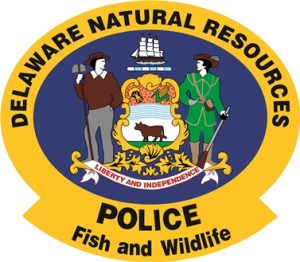Reminder for the week: Time to purchase your 2017 Delaware fishing license
DOVER – To achieve public compliance through education and enforcement actions that help conserve Delaware’s fish and wildlife resources and ensure safe boating and public safety, Fish & Wildlife Natural Resources Police officers between Feb. 27- March 5 made 999 contacts with anglers, hunters, boaters and the general public, including 10 vessel boardings for boating safety, hunting and fishing regulation compliance checks, issuing 10 citations. Officers responded to 35 complaints regarding possible violations of laws and regulations or requests to assist the public. An increased Fish & Wildlife Natural Resources Police presence continued at the C&D Canal Conservation Area and associated recreational trail.
 Fish & Wildlife Natural Resources Police Actions
Fish & Wildlife Natural Resources Police Actions
Citations issued by category, with the number of charges in parentheses, included:
Public Safety: Theft of services (1), and drive a motor vehicle without a valid license (2).
Other: Trespassing after hours on a state wildlife area (6)*, and operating a motor vehicle off an established roadway on a state wildlife area (1)*.
*Includes citation(s) issued at the C&D Canal Conservation Area.
Are you AWARE?
Fish & Wildlife Natural Resources Police remind anglers to purchase their 2017 Delaware fishing licenses. A valid fishing license is required for fishing, crabbing and clamming in Delaware in both tidal and non-tidal waters.
A resident annual fishing license costs $8.50 for ages 16 through 64. Anglers under the age of 16 and residents age 65 and older are not required to purchase fishing licenses in Delaware. Some requirements differ for non-resident anglers. Exempt persons may purchase fishing licenses if they so choose to help support fisheries management in Delaware.
Recreational anglers 16 years and older fishing Delaware waters also are required to obtain a Delaware Fisherman Information Network (FIN) number; this number is generated automatically on all individual fishing licenses sold through Delaware’s electronic licensing system. License-exempt anglers, including Delaware residents 65 and older; non-resident boat fishing license holders who do not have an individual license; and individuals who do not have an individual license fishing on licensed boats must obtain their free FIN number by visiting http://www.delaware-fin.comor calling 800-432-9228 toll-free.
Delaware fishing licenses are sold online, at the licensing desk in DNREC’s Richardson & Robbins Building, 89 Kings Highway, Dover, and by license agents statewide. To find a participating agent, or to purchase a license online, visit Delaware Licenses. For additional information on Delaware fishing licenses, call 302-739-9918.
For more information on fishing in Delaware, click on 2017 Delaware Fishing Guide. The guide also is available in printed form at DNREC’s Dover licensing desk and from license agents throughout the state.
DNREC’s Division of Fish & Wildlife recognizes and thanks the majority of anglers, hunters and boaters who comply with and support Delaware’s fishing, hunting and boating laws and regulations. Citizens are encouraged to report fish, wildlife and boating violations to the Delaware Fish & Wildlife Natural Resources Police by calling 302-739-4580. Wildlife violations may also be reported anonymously to Operation Game Theft by calling 800-292-3030 or online at http://de.gov/ogt.
Like Fish & Wildlife Natural Resources Police on Facebook, www.facebook.com/pages/Delaware-Fish-Wildlife-Natural-Resources-Police.
Follow Fish & Wildlife Natural Resources Police on Twitter, https://twitter.com/DE_FW_NRPolice.
-30-